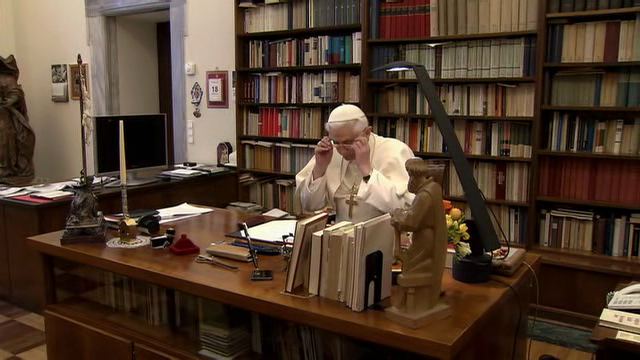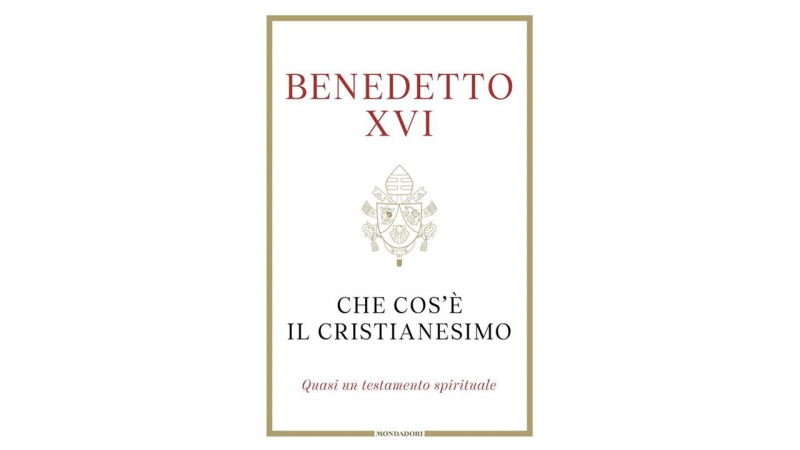Donation in support of Leo’s work through Fundly: https://fundly.com/leo-lyon-zagami-channel or GoFundMe https://www.gofundme.com/f/the-leo-zagami-show-lesule and cashapp/$leozagami

Article by Leo Zagami
Here’s a good question: What is Christianity? Given the current climate in Catholicism under constant attack by post-Conciliar forces, there really seems to be a need to explain it, and never mind if it is a recently deceased Pope who does this job, and never mind if, in the title of the book, Che cos’e il Cristianesimo (“What is Christianity”) there is no question mark because it’s a question that the late Pope Ratzinger was indeed delivering, as also confirmed by inside sources once close to the Pope.
The book collects 16 texts from the period following Benedict XVI’s resignation in 2013, most were written around 2018, with the last in 2022. It has been published by Italian publisher Mondadori on January 18th, 2023, despite the presence of his personal secretary Georg Gnswein as co-curator, whose recent book Nothing but the Truth: My Life Beside Pope Benedict XV, created much controversy, as it is fueled by anger and surprise at being abruptly relieved of his post as prefect of the papal household by Pope Francis. There is no major gossip in this book, but there is indeed criticism, and if anything, a rather theological and biblical depth that is not easily approachable for the common folk. For example, we are faced with certain pages fueled with Old Testament characters, moreover minor ones such as Jezebel, Ahab, Leu, Mattathias, Naboth, Amos, and Amasia, which would make any normal person bored after a few minutes.

However, there is currently some degree of censorship going on regarding this book both from the mainstream as well as the Catholic media, which is completely ignoring the former Pope Emeritus’ work after his death and “low profile” funeral. The book in question is a collection of “small and medium-sized contributions” (lessons, letters, articles, prefaces, clarifications…) both published and unpublished, which the Pope Emeritus specifically asked to be published posthumously to avoid problems.
The other co-curator of the book, the theologian Elio Guerriero, confirms the intention of wanting a posthumous publication by the late Pope Emeritus in the introduction, and Joseph Ratzinger solemnly affirms it in person in the preface:
“This volume, which collects the writings I composed in the Mater Ecclesiae monastery, must be published after my death.”
So many people are now wondering why such a decision was made by Ratzinger. The book, I will say it right away, does not contain any direct attacks on Bergoglio, on the contrary, the various quotations are all positive, and at the end of the fifth chapter, there are unequivocal words of support for the successor:
“I would like to thank Pope Francis for everything he does to continually show us the light of God that has not faded even today. Thank you, Holy Father!”
And yet, if you investigate the content of the book and the timing of his various statements scattered in it, the devil hides in the details, and there is a sense that Ratzinger was censoring himself to not upset the Papal Office he once represented, reaching a comprise with Francis that he kept not only until the end but also afterward. For example, the words above were said a few months before the publication of the infamous Apostolic Letter issued Motu proprio by the Supreme Pontiff Francis Traditionis custodes on the use of the Roman Liturgy, in which the reigning Pope dismantled, in an abrupt manner, the Ratzingerian Motu proprio which liberalized the Holy Mass in Latin, creating much pain in the hearts of Catholic traditionalists. But Ratzinger and his team left them afraid of Pope Francis’ reaction and the controversies that might arise.
However, Benedict decided the book could only be published after his death mainly because he was frightened by the self-styled German Catholics, acting more like Catholic heretics, whose progressive prelates seem more devoted to Sodom than to Christ, capable of threatening schism (see certain bellicose declarations by Cardinal Marx) if the Vatican persists in not blessing homosexual unions, the marriage of priests, and female priesthood, which was inconceivable for Ratzinger’s more traditional approach. Thus, we learn that the hostility of his compatriots was unsustainable for him, and he didn’t want to upset them during his lifetime. Confirmation for all this is provided in the book by Ratzinger, who writes:
“The fury of the German circles against me is so strong that the appearance of my every word immediately causes a murderous shout on their part. I want to spare myself and Christianity from that.”
Gay “clubs” operate openly in Catholic seminaries, the institutions that prepare men for the priesthood, says the late Pope Benedict XVI in the book fueled by Pope Francis’s progressive agenda. In fact, the German Catholics and their progressive clergy will not like any of the things written in this book. There are entire chapters that could even sound anti-Conciliar in nature, but instead, Ratzinger attributes the liturgical degeneration not to the Second Vatican Council that he participated in, but rather to the post-Council Church (the infamous “reception of the Council teachings”).
Unfortunately, the distinction is not very convincing since it is impossible to imagine a post-Council Church without the influence of the Second Vatican Council, and without the Sacrosanctum Concilium, the Conciliar Constitution promulgated by Paul VI in the late 1960s, which I explain in detail in my latest book, Confessions of an Illuminati Volume 8: From the Rise of the Antichrist To the Sound of the Devil and the Great Reset, who allowed parish priests to introduce in the liturgy, guitars, and tambourines. About music, Benedict XVI dedicates “Music and Liturgy,” offering statements of sensational Eurocentrism:
“In no other cultural sphere is there music of equal magnitude to that born in the Christian faith: from Palestrina to Bach, to Handel, up to Mozart, Beethoven, and Bruckner! Western music is something unique, which has no equal in other cultures.” Showing support for European music culture is something that will shock the multicultural world of the present Pachamama Church, which openly promotes Satanic music. The chapter “Monotheism and tolerance” is also quite incendiary in which the Pope Emeritus describes the dictatorial state of today’s democracies imposing their gender ideology and other perversions in the name of tolerance.
Finally, Ratzinger gives us an answer to the question What is Christianity? And the answer is,
“Jesus is the only God who enters the history of religions and deposes the gods.”
OUT NOW: Confessions of an Illuminati Volume 8: From the Rise of the Antichrist To the Sound of the Devil and the Great Reset, the only book out there that could help confused Kanye West aka Ye learn the truth about the Hollywood elite and their secret purpose.
GET ALSO A COPY OF LEO ZAGAMI’S Confessions of an Illuminati Volume 7: From the Occult Roots of the Great Reset to the Populist Roots of The Great Reject
SUPPORT LEO’S WORK BY BUYING HIS LATEST BOOKS!!!
Leo Zagami is a regular contributor to Infowars and the author of the groundbreaking book Confessions of an Illuminati Vol. 6.66 The Age of Cyber Satan, Artificial Intelligence, and Robotics
GET also Confessions of an Illuminati Volume 5: The Decline of the West and the Rise of Satanism in our Society with a brand-new chapter on the CCP virus and The End Times
And don’t forget also Confessions of an Illuminati Vol. 4, American Renaissance 2.0 and The Missing Link From the Invisible World.